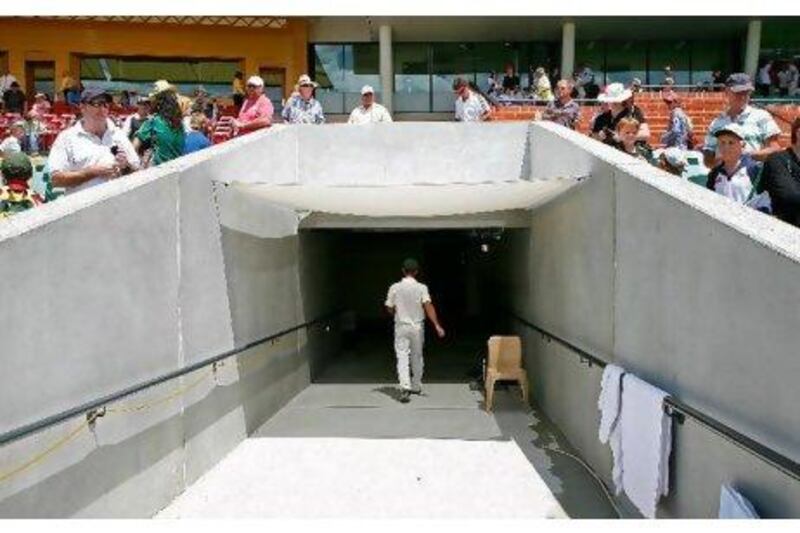Suddenly the prospect of being the first Australian captain in 120 years to lose three Ashes series is very real for Ricky Ponting.
Australia crashed to their first innings defeat in an Ashes Test in 24 years yesterday, surrendering a 1-0 lead to England after two games in the five-match series.
It was here in Adelaide, the last time The Ashes were contested on Australian soil, that the home side pulled off a remarkable victory which proved the catalyst for their 5-0 series whitewash. Four years on, it was an entirely different scenario and an entirely different outcome.
The one constant in both matches was the superb first-innings batting by England's Kevin Pietersen, who scored 158 four years ago and a career-best 227 this time around.
Four years ago, Pietersen being bowled around his legs by Shane Warne on the final morning prompted a batting collapse which saw England lose the game from a seemingly unassailable position of 551 for six declared on day two.
The South African-born Pietersen feels the current dressing room under the leadership of Andy Flower, the coach, and Andrew Strauss, his captain, is a big reason for their success, comparing it highly against the 2006 version under Duncan Fletcher and Andrew Flintoff. "Four years ago was a very, very horrible dressing room to walk into, a very quiet dressing room, a very negative dressing room and not as united as the dressing room is at the moment," Pietersen said.
"Individual performances add to a team victory, and I think the team victory today is incredible, it's the best feeling no matter who takes the wickets or gets the runs."
Despite two victories for England in the last three Ashes series, after Australia won the preceding eight, it had not been possible to talk authoritatively of a change in the balance of power in cricket's oldest international contest - until now.
Although the series is open with three matches to go, Australia have not come from behind to win a home series since 1936/37 when Sir Donald Bradman led them from 2-0 down to win 3-2. The Australians did overcome a 1-0 deficit to win the 1997 series in England.
With only Ponting, Mike Hussey and Michael Clarke remaining from the victorious 2006/07 Ashes side, and Simon Katich, the injured opening batsman, probably out for the series, Australia are relying on a new generation of players to win back The Ashes.
Shane Watson and Brad Haddin, at least with the bat, have shown themselves capable; elsewhere consistency has been a big issue.
The bowling attack, apart from two sessions, has been woeful. England have scored a combined 1,137 for the loss of only six wickets since the start of their second innings in the first Test at Brisbane.
The last time England won by an innings was at Melbourne in 1986, which sealed the 1986/87 series - the last time Australia lost The Ashes on home soil.
Then, as now, Australia's main problem was a depleted bowling attack which had to do without Terry Alderman, Carl Rackeman, Trevor Hohns and Rodney Hogg, who were banned for taking part in "rebel" tours to South Africa.
Between the 1985 defeat in England and the home 1986/87 series, Australia gave debuts to Merv Hughes and Bruce Reid, as well as the bowling all-rounder Stephen Waugh. And although this did not pay off immediately, they all went on to prove pivotal in future Ashes successes. Waugh did so as the batting mainstay in the eight consecutive series winsthat followed.
Australia have more options at their disposal this time, but the job of the selectors is no easier.
Ryan Harris was the best bowler in the second Test but at 31 and with a history of injuries he is not a long-term solution. Mitchell Johnson may well return at Perth but he has shown little sign of being the Australian spearhead since his brilliant tour of South Africa in 2009.
Peter Siddle and Doug Bollinger had good starts to their international careers but showed at Adelaide how far their games need to develop.
Other selections are mooted such as Peter George, who made his international debut in India, and Mark Cameron, the New South Wales bowler, but it seems unlikely they would be able to make a difference in this series.
As for the spin option, Xavier Doherty looks likely to follow Beau Casson, Cameron White, Jason Krejza and Bryce McGain as a spinner selected then rejected since Shane Warne's retirement. Nathan Hauritz is likely to get a recall.
After failing to reach 30 in either innings at Adelaide, Marcus North's place at No 6 is also in jeopardy, although the lack of form from his likely replacements Usman Khawaja or Callum Ferguson may earn him a reprieve.
Also, with Phillip Hughes likely to replace Katich and at least Doherty of the bowlers set to be replaced, Australia may baulk at making too many changes.
Ponting, fighting to avoid the unwanted tag of being the first Australian to be captain during three Ashes series defeats since Billy Murdoch in the 1880-1890 era, says the current crop of players have the ability to be competitive in the series.
"We have faced a lot of challenges and the guys have stood up to those challenges but we haven't been good enough to win them," Ponting said. "That's the bottom line. There's a great challenge there, one for the batting group to stand up and start putting some pressure back on the England bowlers with some partnership and some individuals doing some special things. I think the bowling group, we just have to be able to execute things better."
Ponting said whichever 11 players are selected for Australia: "I expect that they can do the job. This week we haven't done that, it's about finding the attitude, because I know the ability's there to get that job done."





